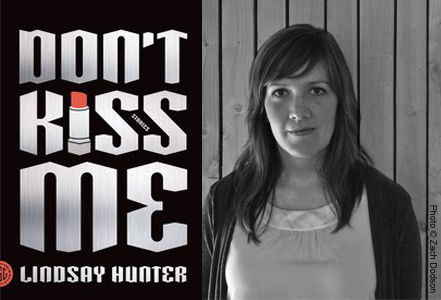Part of the charm of Michael J. Seidlinger’s The Sky Conducting is how the curt and direct writing style – short phrases, pulses of language – is mixed with the novel’s apocalyptic setting. So many books about world-end tend toward the grimmest details, a constant rain of horror and devastation, but Seidlinger instead humanizes his Armageddon, wrapping it in family, in homes remembered, and as such it becomes a book that is easy to hold on to and wonderfully sad to read.
MB: The Sky Conducting heavily relies on reflections of comfort, on humanizing loss. For instance:
The daughter gazed out the window watching nothing and seeing nothing. The rubble impersonated routine life but it wasn’t the same.
The nuclear family had this home.
This home still felt like home. The daughter disagreed. The home died the moment America suffered a heart attack.
Can you talk to us a little about the importance of ‘family’ and ‘home’ in this novel?
MJS: Around the time The Sky Conducting became more than just something in the back of my mind, slowly forming into a stack of ideas and “what-ifs,” I found myself intimidated with how, exactly, to approach something involving the death of America without it literally being about America’s death. I mean, it’s natural to pick at the hypocritical aspects of a nation but most of us already do that on a daily basis. I wasn’t really interested in writing a narrative about road-warrior style survival groups pillaging for food and shelter. There’s this momentum in post-apocalyptic fiction that typically hinges the aftermath to an adventure that’s immediately physical – the impulses and urges, instincts, and imperatives for survival becoming the impetus for most narrative conflicts – however, with The Sky Conducting, I wanted to focus on something closer, more intimate and fixated on the trauma of the everyday citizen.
So if the adventure isn’t physical, it is relocated into the search, and stress test, of something else. This “something else” I wished to be American values. One of America’s most important cultural creations is the concept of “the nuclear family.” Both home and family are constants, pillars of a human being’s need to belong, but our culture turned these constants into something so expected they’re like the obligatory free bread, or chips-and-salsa, at the start of a meal at the average restaurant establishment. We expect these constants to be there, as-is, whether we attain to have them, need them, or not. Every single one of us can fit into one of the four prototypical American nuclear family roles; together we are all daughters and sons, mothers and fathers. The manifestation of the “nuclear family” helped propel the image of the idyllic the happy family” and the safe, quiet, and cozy home into something as easily distinguishable and sought-after as any business or image of success. The concept of the nuclear family is treated with the same care as a business. In fact, I’d go so far as to say that “the nuclear family” is a business.
Wherever we look, the nuclear family plays its part as a step in the ladder the modern American climbs to reach the American Dream, that dream of financial and familial harmony. Even if we don’t intend on pursuing it, we find ourselves chasing some fractured idea of the American Dream. Stripping all of that away, leaving only the nuclear family in a jarring and devastated land, I wanted to take the nuclear family and explore how home and family transform to remain true constants in the characters’ lives.
MB: Personification is also a staple of The Sky Conducting, particularly that of ‘America’ and other countries:
Many countries have died. Countries are people too.
They grow old. They get sick.
They die.
Even the big countries. America has been sick for a long time.
How did you decide on this particular approach / method, and what effect do you hope it has on readers?
MJS: Oh, it was entirely by accident. I tend to write and edit as I go so the visual aspects of the text are as important as the scene, setting, and characters involved. The book started out in a standard prose format. I’d write a page or so and then go back and reread. Typically, I change, at most, phrases that clearly needed touching-up in order to read and generally flow better from line to line. There is the occasional scrapping of an entire section, page, chapter, whatever, if a better approach is identified, but with The Sky Conducting, I kept gutting every paragraph, leaving only the lines stacked one after the other. At first I fought against this by continuing to write in standard prose format only to, yet again, end up editing the text into a similar line-stacking form. I can’t remember how long it took for me to just give up and start writing in the line-stacking fashion but when I did, everything else – the small groupings that results of pushing certain lines together for betting cognition, the Breathing Manner, the use of the house logo – fell into place quite naturally. I’m hoping the structural format helps facilitate an accessible momentum for the reader. Bit by bit, as long as the reader is entertained and interested by the lines, the sparseness and condensed groupings should act like gears on a bike, aiding the reader as they ride up and down each incline and decline of the narrative. This is, of course, only what I hope to be the case and that the effect on the reader is at least partly achieved.
MB: Alongside ‘America’, the sky itself plays an integral role in the novel, even though it is restrained in its contact within the narrative:
The daughter looks up to the sky. She can’t see the sky.
The sky disappears and is replaced with a sheet of dark concealing hate.
What does the sky mean to you, and what does it mean to the characters who populate The Sky Conducting?
MJS: People look up to the sky and project what they want to see onto the sky’s clouds. It’s something revelatory when we want it to be; when we have no reason to slow down and crane our necks up for a look, it’s just a sky, easy to devalue, easy to forget, something without any meaning in our lives. I feel like the sky functions well as a meditative device. For the nuclear family, the sky might show them the way, but they seldom give it much thought. There doesn’t seem to be a reason to look up when everything is looking down. It’s something so common it’s treated as an afterthought. Thusly, the sky is the exemplification of everything important and integral that we take for granted – and it’s right there, hiding absolutely nothing; it just so happens that the characters in The Sky Conducting consume themselves with turmoil so much that they haven’t even the thought to slow down, look around, and appreciate what they still have until after-the-fact, when it’s long gone.
 MB: Nick Antosca, author of Fires, Midnight Picnic, and The Obese, says in his blurb that The Sky Conducting “marks a confident new direction in [your] work.” Can you talk with us about this new direction – where have you been and where are you headed?
MB: Nick Antosca, author of Fires, Midnight Picnic, and The Obese, says in his blurb that The Sky Conducting “marks a confident new direction in [your] work.” Can you talk with us about this new direction – where have you been and where are you headed?
MJS: It used to be that my output was too burdened and bothered by semiotics and the linguistic nature of the English language. Hmm, yeah, my earlier stuff was all about being lost in the words with little to nothing but philosophical quandaries to act as buoys for the reader. Not that my earlier novels are easy reads at all. Honestly, I wouldn’t be able to go back and read any of it.
I went into The Sky Conducting intent on abolishing my linguistic-heavy prose of the past for a truer narrative. I can’t say I was completely successful but at least there was a true beginning, middle, and end with something happening. In my other work, it never seemed like anything was happening. That being said, I’ve become more captivated with the mundane turned on-edge. I love the surrealistic and absurdist narrative mentalities of taking something relatable – be it a setting, situation, concept, or character – and warping the norm so that everything that was suddenly isn’t and the reader can’t help but relish in the mystery while still being able to believe the absurd as something possible. Being able to toy with the surreal while still making it somehow, even distantly, possible is a direction I am compelled to take in the present and near future.
It seems I’m always working on something, or at least telling myself that I am. I can’t help it. If I’m not working on something, I feel like I’m falling apart. If I don’t write every day, I feel like I’m falling to ruin. I can’t help but analyze and edit and analyze and edit and write, and analyze… always about teasing out new ideas, putting more words to the page, and burning whole manuscripts until I have pieces that feel like they are capable of holding the reader’s attention and giving the reader an interesting and entertaining experience.
MB: Lastly, while some authors would prefer to be as far away from the physical design responsibilities as possible,  deferring to the press and its staff for those elements, you took on both the interior layout and the cover design for this novel. Is this usual for your work, and how do you separate your design self from your authorship (or is that even necessary)?
deferring to the press and its staff for those elements, you took on both the interior layout and the cover design for this novel. Is this usual for your work, and how do you separate your design self from your authorship (or is that even necessary)?
MJS: Hmm. I think it’s just because I personally can’t get comfortable enough with an idea until I’ve selected a suitable font, structure, and visual look to accompany the project. The more I think about it, the more I’m beginning to believe that it’s an irrational need to have. I shouldn’t need to typeset everything as I write; I shouldn’t need to have cover pages/front matter, and various images to look at just to start writing… but I do. It’s not a conscious choice that’s for sure. Even when I’m working on cover designs for other friends/authors, I can’t help but read whole chapters of their work until I get a “mood” or “emotional impression” from which I use as material for the resulting design. It’s irrational, yeah, but, I think the design part helps give me an escape from the writing part if and when I hit a problem or challenge that needs a little bit of time and distance to grasp. Throwing the prose into Photoshop, InDesign or Illustrator to slice-and-dice, increase font, boldness, transparency, is different enough so that when I go back to the dreaded Word document with its obnoxious blinking cursor, I have a little bit of a fresher take on the problem. There’s really no way to separate my design-self from my author-self. I’m not sure I can have one and not the other without losing both.
The Sky Conducting is flat out a good book. Don’t let the apocalyptic theme throw you – this isn’t like all of those other novels. This is a vibrant, personal story, and it is as fantastic as it is brutal. Get yourself a copy of The Sky Conducting here, & read more from / about Michael J. Seidlinger here.


